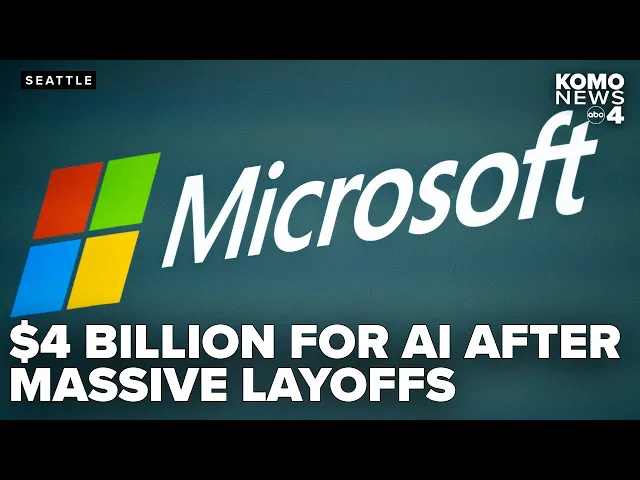Microsoft announces $4 billion AI training initiative amid recent layoffs

Microsoft's $4 billion gamble on AI workforce
In a bold move that signals the shifting priorities of tech giants, Microsoft has announced a massive $4 billion investment in artificial intelligence training. This strategic initiative comes at a particularly interesting moment for the Redmond-based company, coinciding with recent layoffs across various divisions. The juxtaposition of workforce reduction alongside this substantial AI investment reveals much about where Microsoft—and indeed the entire tech industry—is heading in the coming years.
The AI transformation roadmap
- Microsoft's $4 billion initiative focuses on developing AI infrastructure, skills training programs, and research partnerships across multiple countries, indicating a comprehensive approach to AI transformation
- The investment comes amid significant layoffs, highlighting the company's strategic pivot toward AI as it restructures its workforce priorities
- Microsoft is positioning this move as essential for remaining competitive in an AI-dominated future, not merely as a technological upgrade but as a fundamental business transformation
The calculated contradiction
The most compelling aspect of Microsoft's announcement is the apparent contradiction it represents. On one hand, the company is reducing its human workforce through layoffs. On the other, it's making an unprecedented investment in AI training and infrastructure. This isn't simply corporate doublespeak—it represents a profound shift in how major tech companies view their fundamental operational models.
What makes this particularly significant is the timing. We're witnessing the tech industry's transition from merely talking about AI potential to actually restructuring their businesses around it. Microsoft isn't just adding AI capabilities to existing products; they're reimagining their entire workforce composition and skill requirements. This signals that we've moved beyond the theoretical discussion phase of AI adoption into the practical implementation era, where companies are making concrete financial and organizational decisions based on AI's anticipated impact.
Beyond the press release
What Microsoft's announcement doesn't adequately address is the human cost of this transition. While the company frames the $4 billion investment as creating new opportunities, the reality for many displaced workers is more complicated. The skills gap between traditional tech roles and AI-focused positions isn't easily bridged through short-term training programs.
Take for example what happened during cloud computing's rise: many network administrators and on-premises infrastructure specialists found themselves suddenly needing entirely new skillsets. Companies that provided robust transition paths retained valuable institutional knowledge while those that simply replaced workers often struggled with implementation. Microsoft has an opportunity
Recent Videos
How To Earn MONEY With Images (No Bullsh*t)
Smart earnings from your image collection In today's digital economy, passive income streams have become increasingly accessible to creators with various skill sets. A recent YouTube video cuts through the hype to explore legitimate ways photographers, designers, and even casual smartphone users can monetize their image collections. The strategies outlined don't rely on unrealistic promises or complicated schemes—instead, they focus on established marketplaces with proven revenue potential for image creators. Key Points Stock photography platforms like Shutterstock, Adobe Stock, and Getty Images remain viable income sources when you understand their specific requirements and optimize your submissions accordingly. Specialized marketplaces focusing...
Oct 3, 2025New SHAPE SHIFTING AI Robot Is Freaking People Out
Liquid robots will change everything In the quiet labs of Carnegie Mellon University, scientists have created something that feels plucked from science fiction—a magnetic slime robot that can transform between liquid and solid states, slipping through tight spaces before reassembling on the other side. This technology, showcased in a recent YouTube video, represents a significant leap beyond traditional robotics into a realm where machines mimic not just animal movements, but their fundamental physical properties. While the internet might be buzzing with dystopian concerns about "shape-shifting terminators," the reality offers far more promising applications that could revolutionize medicine, rescue operations, and...
Oct 3, 2025How To Do Homeless AI Tiktok Trend (Tiktok Homeless AI Tutorial)
AI homeless trend raises ethical concerns In an era where social media trends evolve faster than we can comprehend them, TikTok's "homeless AI" trend has sparked both creative engagement and serious ethical questions. The trend, which involves using AI to transform ordinary photos into images depicting homelessness, has rapidly gained traction across the platform, with creators eagerly jumping on board to showcase their digital transformations. While the technical process is relatively straightforward, the implications of digitally "becoming homeless" for entertainment deserve careful consideration. The video tutorial provides a step-by-step guide on creating these AI-generated images, explaining how users can transform...
